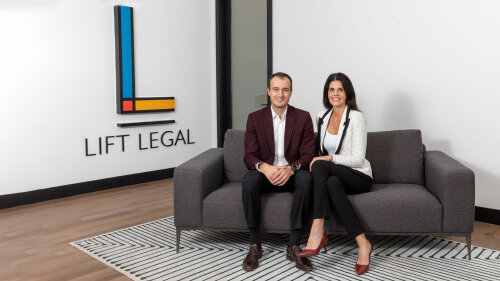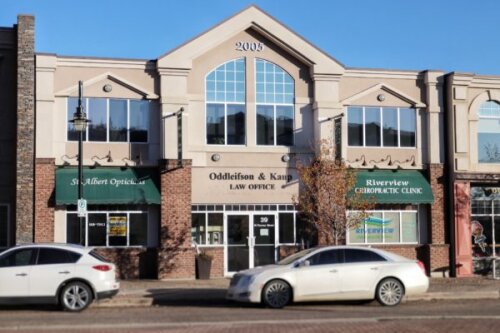Best Lawsuits & Disputes Lawyers in St. Albert
Share your needs with us, get contacted by law firms.
Free. Takes 2 min.
List of the best lawyers in St. Albert, Canada
Canada Lawsuits & Disputes Legal Articles
Browse our 1 legal article about Lawsuits & Disputes in Canada written by expert lawyers.
- Small Claims Court in Ontario Canada - Guide & Process FAQ
- The financial limit for filing a lawsuit in Ontario Small Claims Court is $35,000 CAD, excluding interest and court costs. Plaintiffs generally have exactly two years from the date the dispute arose to file their claim under the Ontario Limitations Act. Winning a judgment does not mean the court will... Read more →
About Lawsuits & Disputes Law in St. Albert, Canada
Lawsuits and disputes law in St. Albert, Alberta, Canada encompasses a broad range of legal conflicts between individuals, businesses, or organizations. This area of law, often called civil litigation, deals with resolving disagreements over contracts, property, debts, injuries, employment matters, and more. Disputes can be settled through negotiation, mediation, arbitration, or by taking the matter before a court. In St. Albert, as in the rest of Alberta, laws and procedures are primarily guided by provincial legislation but sometimes overlap with federal laws, depending on the nature of the dispute.
Why You May Need a Lawyer
People in St. Albert may require legal help with lawsuits and disputes for many reasons. Common situations include disagreements over property lines or landlord-tenant issues, breach of contract cases, unpaid debts, construction disputes, personal injury claims from accidents, employment conflicts such as wrongful dismissal, consumer complaints, and business disagreements. Legal advice can be crucial in understanding your rights, assessing the strength of your case, negotiating settlements, preparing legal documents, and representing you in court if necessary. Even seemingly minor issues can become complicated, so consulting a lawyer early often leads to better outcomes.
Local Laws Overview
In St. Albert, lawsuits and disputes are governed mainly by Alberta’s provincial laws, notably:
- Civil claims under $100,000 are often handled by the Alberta Court of Justice (Civil Division), previously called Provincial Court. Cases above this threshold are dealt with in Court of King’s Bench.
- The Alberta Rules of Court outline litigation processes for higher courts, including filing deadlines, disclosure obligations, and hearing procedures.
- Special statutes may apply to specific types of disputes, like landlord-tenant issues (Residential Tenancies Act), employment (Employment Standards Code), or consumer complaints (Fair Trading Act).
- Alternative dispute resolution methods, such as mediation and arbitration, are encouraged and sometimes required before a matter goes to trial.
Timing is important: most lawsuits are subject to limitation periods set out in the Alberta Limitations Act, which restrict your ability to bring a claim after a certain period has passed since the event occurred.
Frequently Asked Questions
What is the first step if I want to start a lawsuit in St. Albert?
Generally, the process begins by filing a claim in the appropriate court. For most civil matters under $100,000, this would be in the Alberta Court of Justice using a Civil Claim form. Larger or more complex cases go to the Court of King’s Bench. You must provide details of your claim and serve the other party with notice.
How long do I have to start a lawsuit?
Most civil lawsuits in Alberta must be filed within two years from the date you became aware or ought to have become aware of the issue (for example, a breach of contract or an injury). There are some exceptions, so it is best to check with a lawyer about your specific situation.
Can lawsuits or disputes be resolved without going to court?
Yes. Many disputes are settled through negotiation, mediation, or arbitration before reaching trial. Courts also encourage parties to resolve their differences outside of the courtroom, when possible.
What kinds of disputes are most common in St. Albert?
Common disputes include landlord-tenant issues, property boundaries, unpaid debts, contract breaches, personal injury from car accidents or slip-and-fall incidents, employment terminations, and small business conflicts.
How much does it cost to hire a lawyer for a lawsuit?
Legal fees can vary widely. Some lawyers charge hourly rates, while others may offer flat-fee or contingency arrangements (especially in personal injury cases). It is wise to ask for an estimate and fee agreement up front.
What if I cannot afford a lawyer?
There are several options, including free or low-cost legal clinics, Legal Aid Alberta (if you meet financial eligibility criteria), and self-help resources provided by the courts.
Do I need to gather evidence for my case?
Yes. Keeping documents, photos, correspondence, and any records relevant to the dispute is vital. Evidence strengthens your position, whether for court or settlement discussions.
What should I do if I am served with court papers?
You should respond promptly as required. Most court documents have strict timelines for reply. If you ignore them, you risk a default judgment against you. It’s best to seek legal advice immediately after being served.
Can I represent myself in court?
Yes, individuals can represent themselves, particularly in small claims court. However, the legal process can be complex, and professional assistance usually provides better results.
How long do lawsuits and disputes take to resolve?
Resolution time varies depending on the complexity of the dispute, willingness of the parties to negotiate, and the court’s schedule. Simple matters may settle in weeks or months, while complicated cases can take a year or more.
Additional Resources
Here are some helpful organizations and resources for those in St. Albert:
- Alberta Courts: Information, forms, and guides for civil litigation.
- Legal Aid Alberta: Financially-eligible residents can access legal help.
- Centre for Public Legal Education Alberta (CPLEA): Clear, plain-language legal information.
- Edmonton Community Legal Centre: Free legal advice for low-income individuals in the region.
- St. Albert & District Chamber of Commerce: Useful for small business dispute resources.
- Law Society of Alberta: Find licensed lawyers in your area.
Next Steps
If you are facing a legal dispute or considering a lawsuit in St. Albert, here’s how to proceed:
- Gather and organize all documents related to the dispute (contracts, correspondence, receipts, etc.).
- Make notes on key facts, dates, and people involved.
- Consult a lawyer or legal clinic early for advice on your specific rights and options.
- Be mindful of deadlines-respond promptly if served with any legal papers.
- Consider mediation or negotiation as early resolution options.
- Stay informed about local procedures and court rules to avoid unnecessary delays or mistakes.
Taking proactive steps and seeking professional legal help early can make the process smoother and improve your chances of a favourable resolution.
Lawzana helps you find the best lawyers and law firms in St. Albert through a curated and pre-screened list of qualified legal professionals. Our platform offers rankings and detailed profiles of attorneys and law firms, allowing you to compare based on practice areas, including Lawsuits & Disputes, experience, and client feedback.
Each profile includes a description of the firm's areas of practice, client reviews, team members and partners, year of establishment, spoken languages, office locations, contact information, social media presence, and any published articles or resources. Most firms on our platform speak English and are experienced in both local and international legal matters.
Get a quote from top-rated law firms in St. Albert, Canada — quickly, securely, and without unnecessary hassle.
Disclaimer:
The information provided on this page is for general informational purposes only and does not constitute legal advice. While we strive to ensure the accuracy and relevance of the content, legal information may change over time, and interpretations of the law can vary. You should always consult with a qualified legal professional for advice specific to your situation.
We disclaim all liability for actions taken or not taken based on the content of this page. If you believe any information is incorrect or outdated, please contact us, and we will review and update it where appropriate.
Browse lawsuits & disputes law firms by service in St. Albert, Canada
St. Albert, Canada Attorneys in related practice areas.










